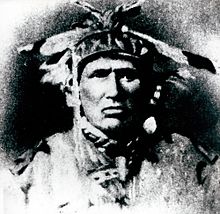Shingwauk
| Shingwaukonse | |
|---|---|

Chief Shingwauk at Robinson Huron Treaty Signing in 1850
|
|
| Born | 1773 |
| Died | 1854 |
| Nationality | Ojibwe |
| Other names | Shingwauk, Little Pine, Zhingwaakoons, Shinguacouse |
| Occupation | Indigenous chief and warrior |
| Known for | Signatory to Robinson-Huron Treaty |
Shingwaukonse (Fiero spelling: Zhingwaakoons; "Little Pine"), or Shingwauk (Fiero spelling: Zhingwaak; "Pine") (1773–1854) was an Anishnaabe chief, who was instrumental in the establishment of the Garden River First Nation near Sault Ste. Marie, Ontario as a signatory to the Robinson Huron Treaty of 1850.
Shingwaukonse was born in the Sault Ste. Marie area in 1773. The names of his parents are unknown but his mother was from the crane clan it has been suspected that his father was a British settler.
Shingwaukonse had many children including Augustine (1800-1890), Buhgwujjenene (1811-1900), John Askin (1836-1919), and George Menissino (1838-1923). (Fiero spelling: Bagwajinini; "Wildman"), who both served as successive hereditary chiefs of Garden River after Shingwauk's death. Augustine served as herditary chief from 1854-1890 and Buchkwujjene held the position from 1890-1900. Shingwaukonse's youngest son, George Shingwauk (1838-1923) (also known as George Menissino or George Pine), was elected chief of Garden River First Nation from 1899-1902 and again from 1903-1916.
Other less well known children of Shingwauk include: Tegoosh (1796-1876), Thomas Shingwauk (1796-1883), Nahwahquashkum (1799-1840), Jean Baptise Tegoosh (b. 1799), Waintegoochequai (b. 1800), Owiaquahgeyhegoqua (b. 1805), Marie (1816-1887), Ogimaqua (b. 1813), Joseph Shingwauk (b. 1837), and Louis Shingwauk (1839-1899).
He was a well-known member of the Midewiwin lodge and a follower of traditional Anishnaabe religion for most of his life, Shingwauk converted to Anglicanism in approximately 1833. He died in March of 1854.
Shingwaukonse is also known for his role as a national leader during the War of 1812. He fought on the side of the British during the War. He received a handful of commendations for his wartime service including a chief's medal, and the general military service medal. Following the war Lieutenant Governor Sir John Colbourne also bestowed another medal on him for his service. His wartime contributions resulted in him receiving the "deserving chief" status which was granted to Indigenous chiefs in British North America who had served the crown during the War of 1812. Tangibly, this status resulted in preferred treatment by the crown and superior 'presents' from the government during any negotiations.
...
Wikipedia
